What Is Couscous and How Do You Use It?
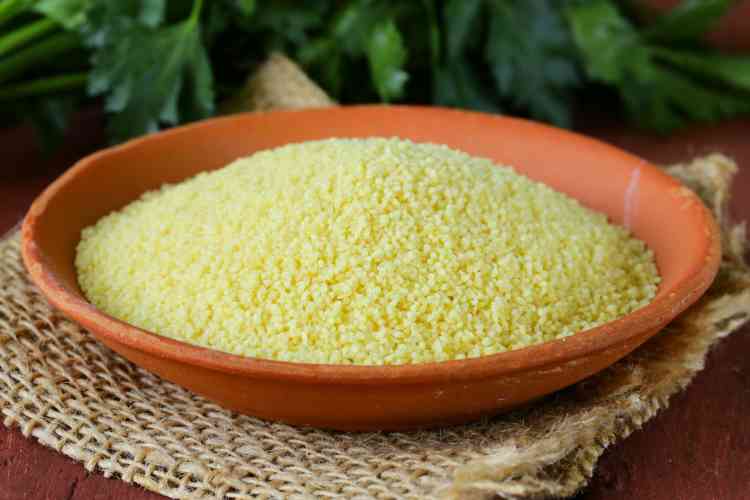
How familiar are you with the magic of couscous? Couscous is a versatile food that lends itself to a wide range of meals and cuisines. It started as a North African delicacy but has since become a widely known kitchen staple. However, there’s still an element of mystery that surrounds the adaptable dish.
Luckily, we’re here to peel back the layers and teach you everything you need to know about couscous, allowing you to truly embrace it in the kitchen. Whether you want to use couscous as a side or as the star of your meal, this guide to couscous is exactly what you’re looking for!
- What Is Couscous?
- How Is Couscous Made?
- Where Is Couscous From?
- What Does Couscous Taste Like?
- How to Cook Couscous
- How Long Does Couscous Last?
- Is Couscous Healthy?
- Is Couscous Gluten-Free?
- Is Couscous Vegan?
- Where to Buy Couscous
What Is Couscous?
Couscous is a popular dish of North African origin that’s growing in popularity due to its versatility in the kitchen and fast cook time. Couscous is often served with vegetables, fruit or a wide range of proteins, so it works well as both a side dish and a main course.

What Is Couscous Made Of?
So, what is couscous made of? Couscous is made from a mixture of semolina flour, which is a type of flour ground from durum wheat, and water. The semolina is moistened and rolled into small granules of couscous.
Is Couscous a Pasta or Is Couscous a Grain?
Because many grocery stores will stock couscous in the grain section near the rice, people understandably wonder, “Is couscous a whole grain?” The truth, however, is that couscous is actually a type of pasta, most commonly made from a mixture of semolina flour and water.
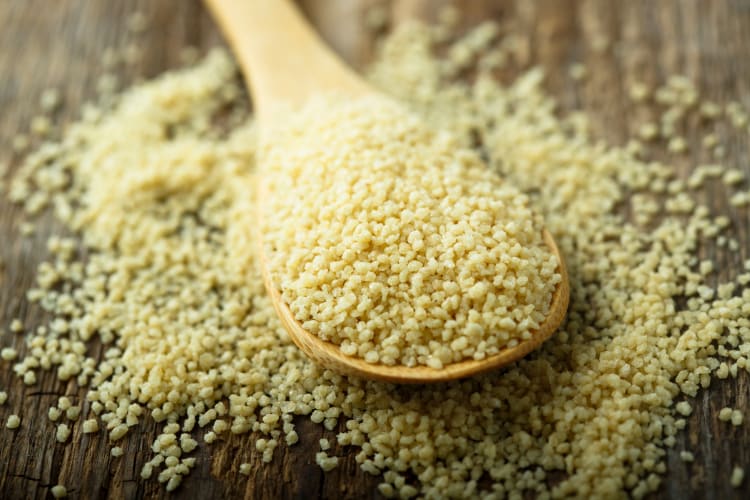
What Are the Different Types of Couscous?
There are three main types of couscous: Moroccan couscous, pearl couscous and Lebanese couscous. Moroccan couscous is the smallest type of couscous, which means it also takes the least amount of time to cook. A box of instant Moroccan couscous from the store usually only takes a few minutes to cook once you add boiling water.
Sometimes called Israeli couscous, pearl couscous is significantly larger than Moroccan couscous. The pearl-shaped pasta pieces are typically nutty in flavor with a slightly chewy texture. Lastly, Lebanese couscous, also known as moghrabieh couscous, is the largest of the couscous varieties. Each piece is around the size of a chickpea.
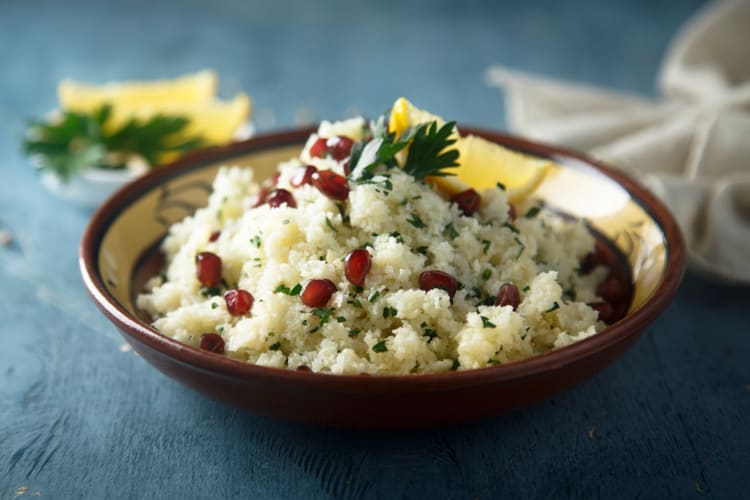
What Is Pearl Couscous?
Pearl couscous, also known as Israeli couscous, is larger than Moroccan couscous but smaller than Lebanese couscous. It has a nutty flavor and a chewy, soft texture, making it a popular addition to salads and stews. Most instant pearl couscous takes around 10 minutes to cook once you add boiling water. It’s called “pearl couscous” due to its round, pearl-like shape, which adds an element of springiness to each bite.
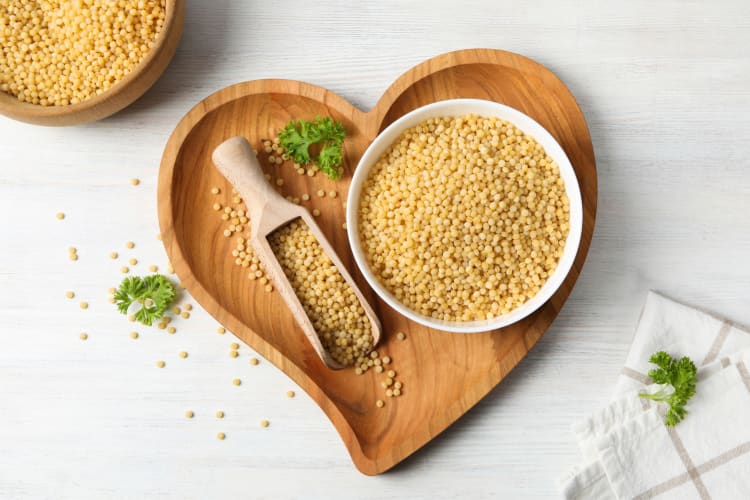
Couscous vs. Quinoa: What’s the Difference?
While both couscous and quinoa are popular additions to a vegan bowl or salad, they are very different ingredients. Couscous is made from flour, while quinoa is actually a seed. Couscous, by nature, contains gluten, while quinoa is gluten-free. Quinoa also has a few grams of additional protein per cup.
In terms of flavor, couscous has more of a neutral profile, while quinoa has a stronger, nuttier flavor with a bit more bite. Despite their differences, couscous and quinoa can often be used interchangeably in recipes. They’re both popular additions to salads or served mixed with vegetables or meat as a side dish.
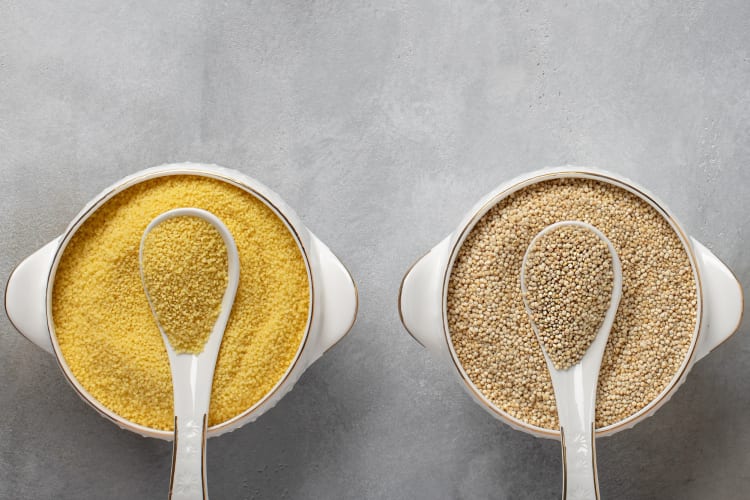
How Is Couscous Made?
Couscous is made with semolina wheat. It’s combined with water and tossed with fine wheat flour before being rolled into small round pieces of pasta. Once the balls are dry, they are quickly steamed before they are packaged and sold as instant couscous.

Where Is Couscous From?
You may also be wondering: "Where does couscous come from?" Couscous originated in North Africa and became a staple in many North African and Middle Eastern cuisines. Today, couscous is manufactured and consumed all over the world.
What Does Couscous Taste Like?
Couscous has a very neutral flavor, often taking on the flavors of whatever sauce or seasoning you serve with it. On its own, couscous has a similar taste to pasta. But the larger the couscous variety, the more nutty flavor it has.

How To Cook Couscous
If you want to know how to cook couscous, just think about how you cook pasta. Most couscous is packaged as instant couscous, meaning you cook it by combining it with boiling water. A general rule of thumb is a cup of water for every cup of couscous, but the cooking times vary depending on the variety of couscous you’re using. For example, smaller Moroccan couscous only takes a few minutes to cook, while larger Lebanese couscous can take about 10 minutes.
If you want more tips on how to make couscous, check out cooking classes near you. You can also look at the large offering of online cooking classes, and find a class that features a cuisine that explores couscous and its potential.

Can You Cook Couscous in a Rice Cooker?
You can definitely use your rice cooker to make couscous. Just use one cup of liquid for every cup of couscous, then cook on the white rice setting.
How To Season Couscous
Couscous is a wonderful blank canvas for flavor, so there is an array of different ways you can season it. Many chefs will cook it in olive oil before combining it with water to add some flavor. Besides that, basic seasonings like salt and pepper work wonderfully with couscous, as do other spices like garlic powder, paprika, cayenne and turmeric. You can also cook your couscous in broth instead of water if you want an extra punch of flavor. The options are endless!
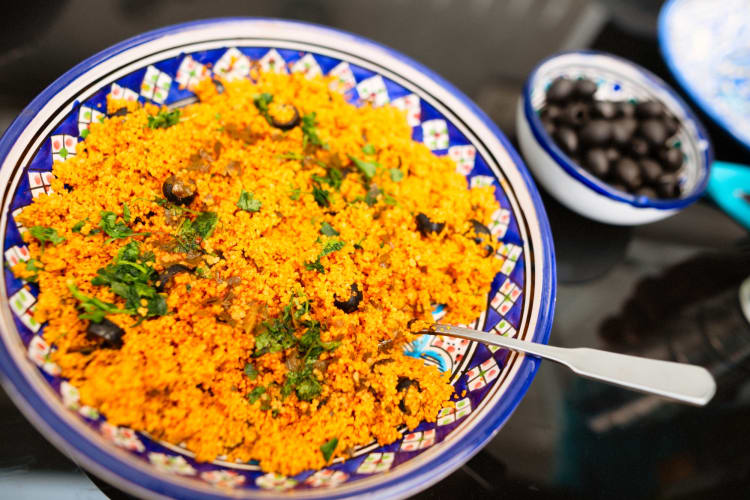
What To Eat With Couscous
Couscous recipes are widely popular thanks to couscous’s versatility and neutral flavor. One of the most popular dishes is a couscous salad which uses fresh herbs, lemon juice, and whatever vegetables and protein you desire. Many healthy appetizers also use couscous, like herby couscous-stuffed eggplant rolls.
You can additionally pair couscous with a wide range of meats and fish, including chicken, lamb and salmon. Couscous cooks quickly, and it can be served hot or cold, so it’s perfect as a midday snack or as an addition to a one pot meal.
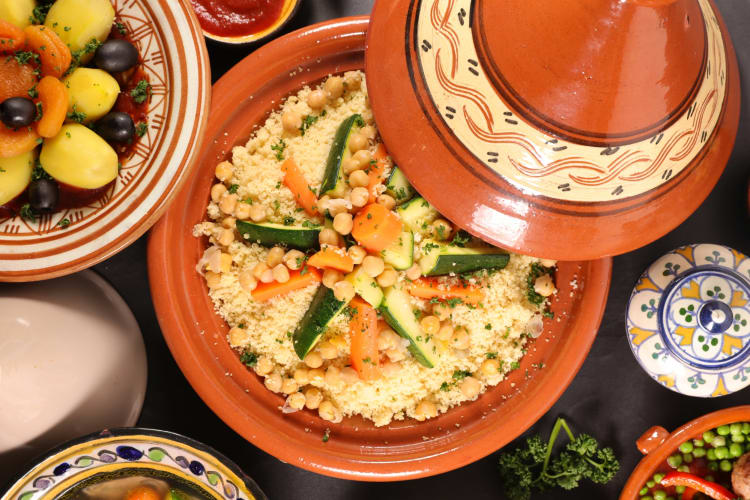
How Long Does Couscous Last?
Cooked couscous can typically last for about three to five days in the fridge if stored in an airtight container. But if it’s stored with other foods like vegetables or meat, that can impact how long it lasts in the fridge. For uncooked couscous, as long as you keep it cool and dry, it can last for months past its expiration date, similar to rice and pasta.
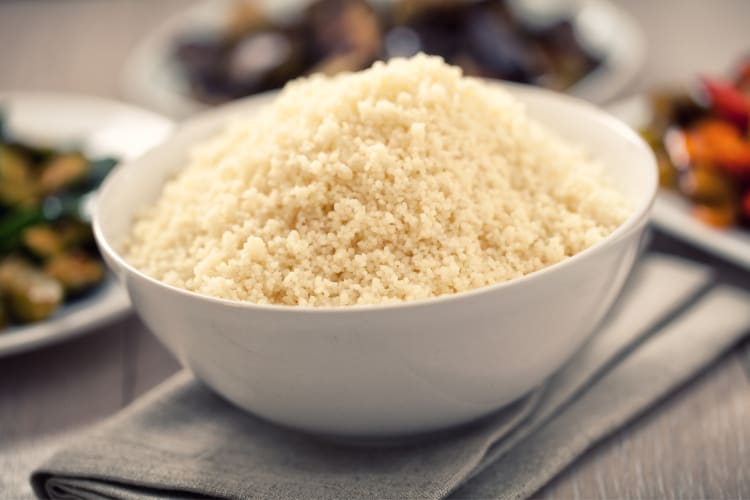
Can You Freeze Couscous?
Yes, you can freeze couscous. However, we recommend that you let the couscous cool and spread it out on a sheet pan before you freeze it to prevent unwanted clumping. Frozen couscous should last about four to five months.
Is Couscous Healthy?
Is couscous good for you? Like most foods, couscous has nutritional benefits as well as drawbacks, but if it’s portioned correctly, it can definitely be part of any healthy diet. Couscous, especially whole wheat couscous, is high in fiber and generally low in fat. It also contains a solid amount of plant-based protein, as well as other minerals and vitamins. But, similar to pasta and rice, it needs to be eaten in moderation.
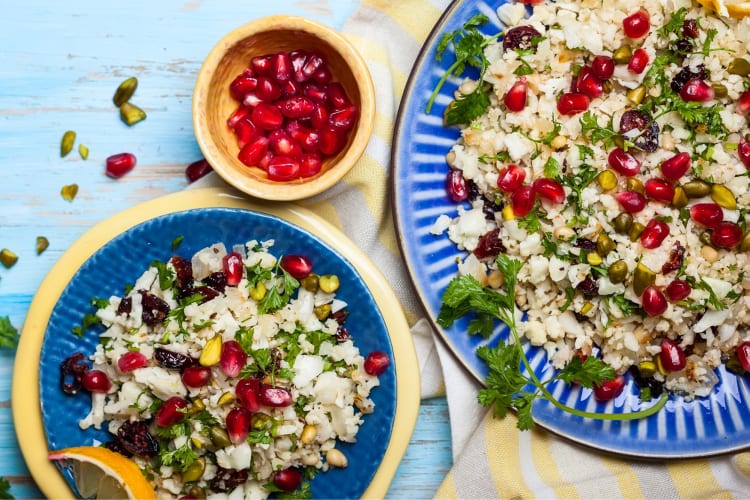
Is Couscous a Carb?
When thinking about the nutrition of couscous, it’s important to remember that at the end of the day, it’s a type of pasta. So, similar to pasta, couscous is considered a carbohydrate. It has a pretty high count of simple carbohydrates, which your body quickly converts into energy.
Does Couscous Have Protein?
One somewhat surprising couscous nutrition fact is that it’s a solid source of plant-based protein. Couscous provides about six grams of protein per cup, so it’s an excellent protein option for people who don’t eat meat, especially when combined with another plant-based protein like chickpeas.
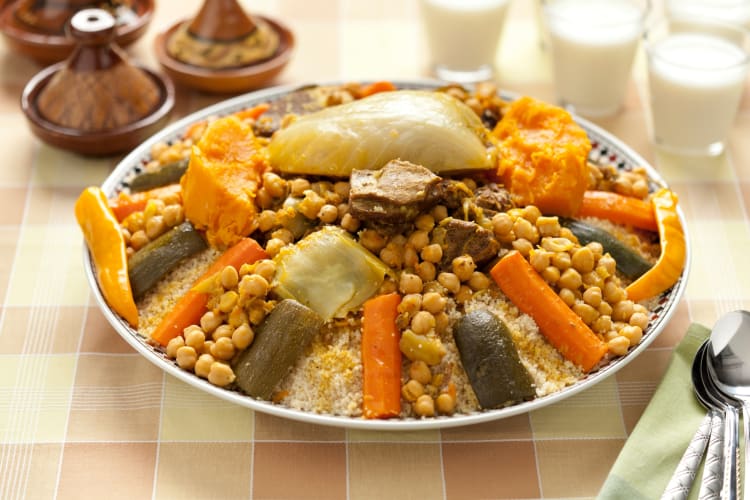
Is Couscous Healthier Than Pasta?
Generally, Italian dry or fresh pasta is slightly higher in carbs and calories than couscous. However, as both are classed as pasta, the two foods have a pretty similar nutritional profile.
Is Couscous Healthier Than Rice?
Rice and couscous are often side by side in the grocery store. But is rice healthier than couscous? Couscous generally contains fewer carbohydrates than rice. Couscous also contains more protein and fiber as well as additional vitamins and minerals. However, the two foods have similar amounts of calories.
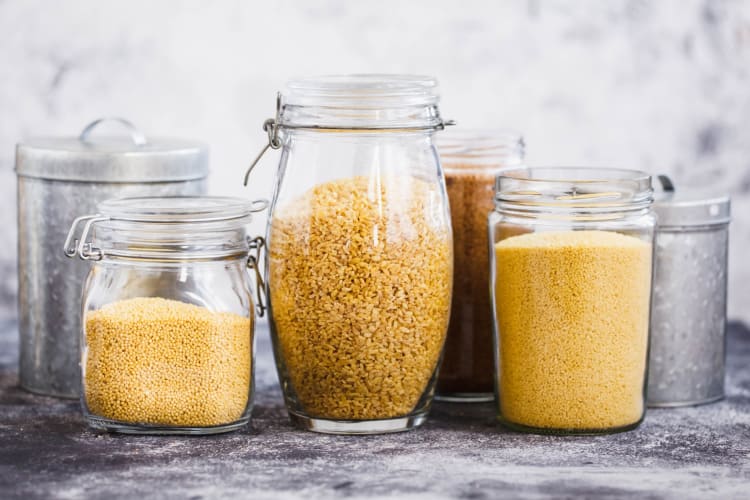
Is Couscous Gluten-Free?
Does couscous have gluten? By nature, couscous made from wheat isn’t gluten-free. But you can find gluten-free couscous products using ingredients like corn or potatoes in place of wheat.
Is Couscous Vegan?
Couscous is definitely vegan. However, because couscous is often mixed with other ingredients, it’s important to ask your server or host what else is in a prepared couscous dish if you’re following a plant-based diet.
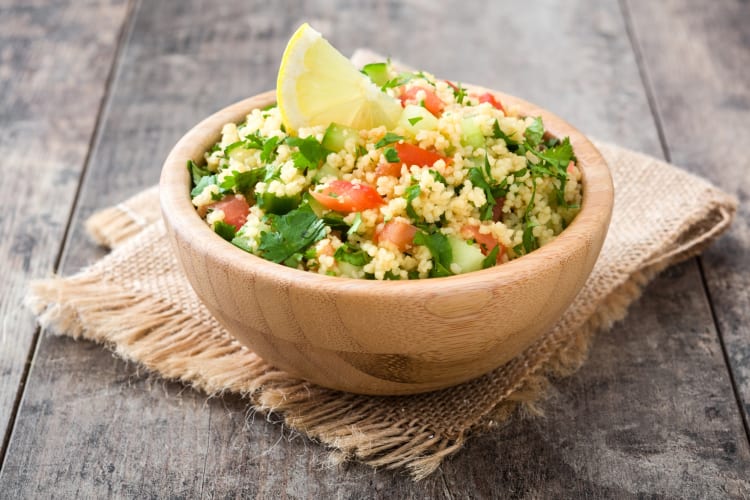
Where To Buy Couscous
If you want to try couscous, you can purchase it at most grocery stores. Despite it not being a type of rice, couscous is often found next to the rice products in grocery stores instead of in the pasta aisle. If you want to try pearl or Lebanese couscous, you may have to go to a store that specializes in Middle Eastern and North African cuisine or purchase the product online.
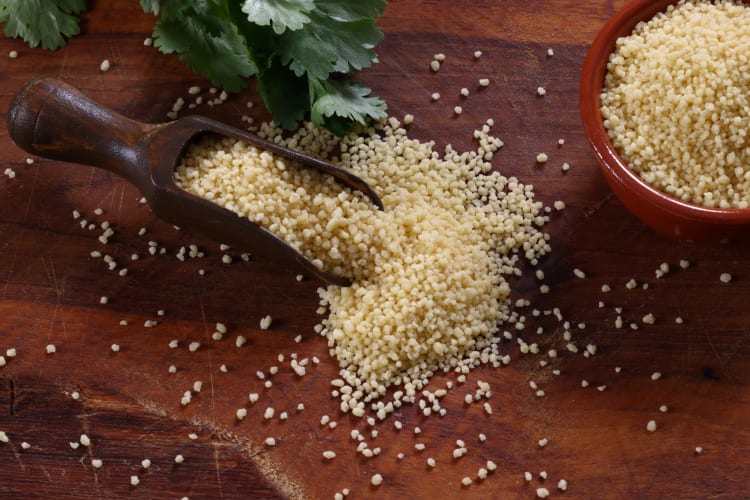
With its quick prep time, nutritional benefits and ability to soak up flavors, it’s no surprise that couscous is such a popular ingredient for such a wide range of dishes. Hopefully, this guide helped you learn about this versatile ingredient, and you’ll be able to use it in future recipes!
For even more ways to explore your favorite foods, check out other experiences happening on Cozymeal.
